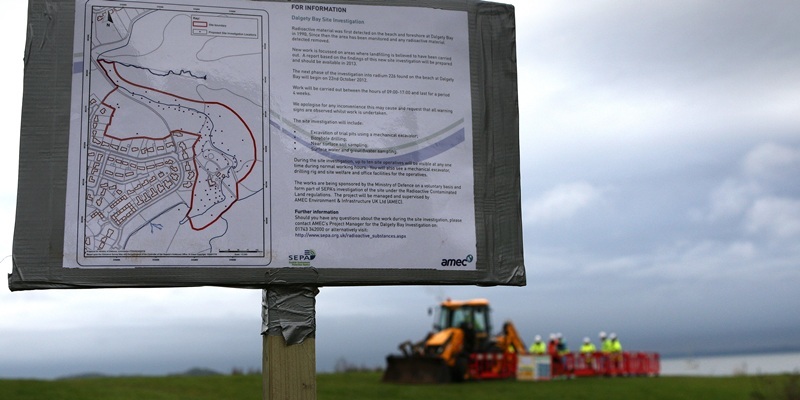The immediate threat to designate Dalgety Bay beach as the UK’s first radioactively contaminated land has been lifted.
The Scottish Environment Protection Agency announced that a plan to investigate and clean up the hazardous materials on the beach has finally been agreed with the Ministry of Defence.
However, it has been stressed the investigation works will take some time and action will not be taken until at least May next year.
Sepa warned that it could still designate the area at any time if the work undertaken by the MoD is considered inadequate or if further information comes to light.
The agreement was outlined at a public meeting in Dalgety Bay on Tuesday night.
At the meeting, MP Gordon Brown pledged there would be no let-up on the polluters and called for further clarification from the environmental agency on a date and timetable for a clean-up and on who would fund it.
He said: ”The pressure of the community council and residents have forced more monitoring and an investigation into the state of the area to be completed by May 2013 but we have yet to get an agreement on funding of and timetable for remedial work.
”This may lead the Ministry of Defence to believe that no remedial work may be necessary.”
He added that it was therefore right that while the immediate risk of designation has been lifted, the Ministry of Defence is left in no doubt that designation is a threat until the clean-up is done.
Mr Brown told the dozens of concerned Dalgety Bay residents at the meeting that he is in no doubt the Ministry of Defence is responsible for funding the clean-up of the area.
”Not only did the Ministry of Defence agree responsibility when I was in government but the previous Conservative Government accepted the Ministry of Defence was responsible,” he said.
”It may seem ironic that when it wasn’t going to cost them that much they accepted liability but now when it may cost them some money they’re doubting responsibility.”
Mr Brown added: ”There are a number of sites across the UK where there may be radiation and they don’t want to start a precedent.”
He said the worst case scenario for the community would be for the 15 months of investigations to end only for the MoD to deny responsibility.
”They would then be taken to court by Sepa who would have to designate the area simply to get the work done,” he said. ”There is no doubt the material came from the Ministry of Defence and any attempt to deny that fact is something the people in this area will not accept.”
Sepa set deadlines for the MoD to provide a credible remediation plan for the area in November last year. Further work over the winter showed the situation was more complicated.
Dr James Gemmill, Sepa’s radioactive substances unit manager, said: ”We must emphasise that once the plan is implemented, which we expect by the end of May 2013, Sepa will be in full possession of technical issues including dumping areas, distribution of the hazard posed by radioactive material, impact of shore erosion and ownership history.”
